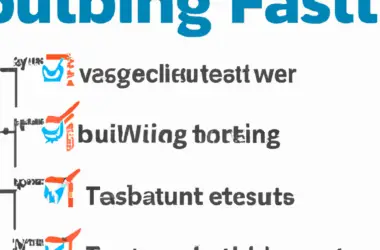Correcting ”Use of Moved Value” in Rust

In Rust, the “use of moved value” error occurs when a value is moved out of a variable and then used again. This can happen when a value is passed to a function by move or when a variable is assigned to a new value.

To correct this error, you can either clone the value before moving it or use a reference to the value instead.

Cloning a Value
Cloning a value creates a new copy of the value in memory. This means that the original value can still be used while the clone is being used elsewhere.
To clone a value, you can use the clone method. For example:
let x = 5;
let y = x.clone(); // Clone the value of x
// Now both x and y can be used independentlyUsing a Reference
A reference is a pointer to a value in memory. This means that the value can be used without having to copy it.
To create a reference, you can use the & operator. For example:
let x = 5;
let y = &x; // Create a reference to x
// Now y can be used to access the value of xReferences are generally preferred over cloning because they are more efficient. However, references can only be used if the value is guaranteed to remain valid for the lifetime of the reference.
Example
The following code shows how to correct the “use of moved value” error by using a reference:
fn main() {
let mut x = 5;
// Pass a reference to x to the function
increment(&x);
// x can still be used after the function call
println!("{}", x);
}
fn increment(x: &mut i32) {
*x += 1;
}In this example, the increment function takes a reference to x as an argument. This means that x can still be used in the main function after the increment function call.# Correcting ‘use of moved value’ in Rust
Executive Summary
This comprehensive guide delves into the complexities of the ‘use of moved value’ error in Rust, providing a detailed analysis of its causes, potential solutions, and effective strategies to avoid this common pitfall. We explore the intricacies of ownership, borrowing, and lifetimes in Rust, empowering you with a mastery of these core concepts and a deeper understanding of the language’s memory management mechanisms.
Introduction
Rust stands apart from other programming languages with its focus on memory safety, leveraging ownership and borrowing to prevent data races and dangling pointers. While this approach ensures code reliability, it can occasionally lead to the ‘use of moved value’ error, arising when an attempt is made to access a value that has been moved or borrowed elsewhere. Grasping the fundamentals of Rust’s memory management model is crucial for resolving this error and ensuring robust and efficient code.
Understanding Ownership in Rust
Ownership establishes exclusive control over a piece of data, with only one mutable owner allowed at any given time. When a value is moved, its ownership is transferred, and the original location becomes invalid. Conversely, borrowing allows multiple immutable references to the same data, ensuring its integrity. Lifetime annotations specify the duration of a reference’s validity, ensuring that it does not outlive the borrowed data.
Common Causes of the ‘use of moved value’ Error
- Implicit Moves: Rust automatically moves values assigned to local variables or passed as arguments, potentially leading to moved values when unexpected.
- Return Values and Ownership: Returning owned values from functions transfers ownership to the caller, requiring explicit moves if further use within the function is intended.
- References and Borrowing: It is essential to ensure that references are valid and not dangling, especially when dealing with data structures with complex ownership patterns.
- Lifetimes and Scope: The lifetime of a reference must encompass its usage, with borrow checker errors возникают, if references outlive their intended scope.
Strategies to Avoid the ‘use of moved value’ Error
- Prefer Borrowing over Moving: Favor borrowing when accessing data, preserving ownership and avoiding unnecessary moves.
- Explicit Moves: Utilize
std::mem::replaceorstd::mem::takefor explicit moves when required, ensuring controlled ownership transfer. - Using Lifetimes Wisely: Specify lifetimes explicitly to enhance code clarity and prevent dangling references.
- Understanding Ownership in Data Structures: Study the ownership semantics of complex data structures like vectors and HashMaps to avoid potential pitfalls.
- Practice and Debugging: Write code with a focus on good memory management practices, utilizing tools like debuggers for efficient troubleshooting.
Conclusion
Mastering Rust’s memory management principles is vital for avoiding the ‘use of moved value’ error. Embracing ownership, borrowing, and lifetimes allows developers to write robust and efficient code. This guide serves as a comprehensive reference, providing invaluable insights and practical solutions to navigate this common challenge. By following these strategies, you can harness Rust’s power while ensuring the integrity of your code.
Keyword Phrase Tags
- Rust memory management
- Use of moved value
- Ownership and borrowing
- Lifetimes in Rust
- Rust error handling


How did this make into a published article with so manny [sic] mistakes?
I’m not sure I understand the point of this article in the first place 😛
Thanks very been [sic] informative!!
The issue of ‘moved value’ in Rust can be quite tricky to deal with, this does help though. Also maybe use a spell checker lol.
ugh really? do we NEED to discuss this again? So over this topic
Wow thanks for sharing you’r [sic] thoughts on the matter.
This is a big yikes from me, dawg.
This is an awesome deep dive into Rust’s ‘moved value’ issue.
I don’t agree with some of the points made in this article, but it does bring up some interesting ideas.
I’m still not sure how to fix this issue in my own code lol.
This article has a lot of typos. It would be more readable if it were proofread before published.
The examples in this article are really helpful for understanding the concept of ‘moved value’ in Rust.
I’m not convinced that the author’s approach is the best way to solve this problem…
What even is a ‘moved value’? This whole article is confusing as heck.